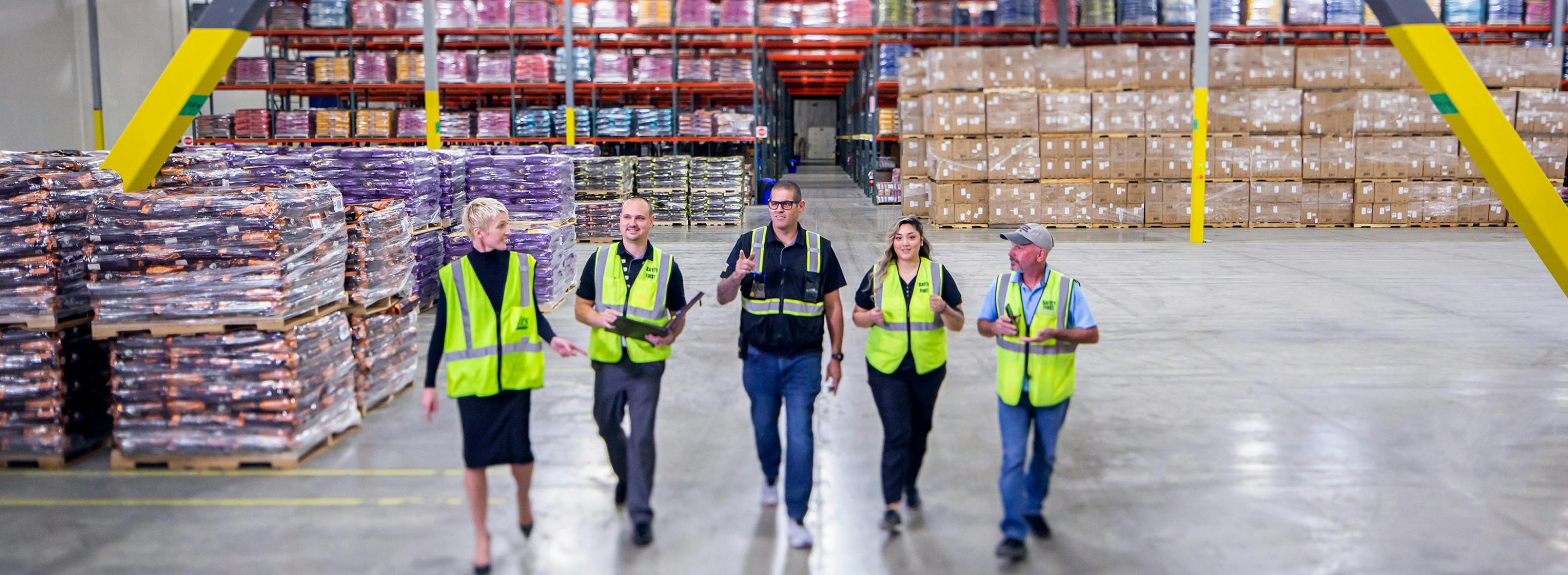Solving the Supply Chain Talent Crisis: How Logistics Training Programs Are Shaping the Future of the Industry

It wasn’t until the great toilet paper shortage of 2020 that most consumers realized just how much supply chains impact our daily lives. But the truth is that logistics—encompassing everything from the physical movement of goods to the analysis of distribution strategies and navigation of global trade policies—has been one of the fastest-growing industries for over a decade now. According to the Bureau of Labor Statistics, payroll for jobs in transportation and warehousing rose approximately 47% between 2013 and 2023, reflecting an unrelenting demand for goods and products in an increasingly globalized economy.
At the same time as this booming growth, though, logistics faces a serious dilemma: a looming talent crisis. Several key sectors face an aging workforce without younger generations filling the pipeline, and current workers face a critical skills gap in AI and digital transformation.
Reporting on this in 2025, when some argue the job market is the worst they’ve ever seen, it’s hard to imagine any industry is struggling to find candidates. What’s behind the disconnect between an eager workforce and a booming industry?
The Rise of Alternative Career Paths
One major factor causing a disconnect between logistics opportunities and future logisticians is the current education pathway—with soaring costs being a primary concern. In 2024, the average annual cost of attending a public four-year university topped $25,000. The magnitude of debt and increasing competitiveness/diminishing return on job outlook has caused a soft plateauing of college admissions for recently graduated high school students compared to the past several decades. Moreover, vocational training, paid apprenticeships, and other skills-based programs are being increasingly favored by younger generations. Gen Z has even been dubbed the “Toolbelt Generation” as they embrace a return to the trades—which have recently undergone somewhat of an unintended rebrand thanks to new technologies making many fields safer and easier.
Even if cost wasn’t a concern, only a handful of schools in the US offer programs dedicated to supply chain management and logistics operations. This means that students who graduate with four-year degrees rarely have the skills needed for most roles in the industry—or even an awareness of its fruitful career opportunities.
It’s the perfect storm: A pressing need for supply chain talent and a lack of educational pathways that provide it. How can companies adapt when traditional career pipelines aren’t fulfilling the demand?
Paid Logistics Training Programs: The Solution to Everyone’s Supply Chain Headaches
To address the challenge, many companies are taking a DIY approach, investing in structured, paid training programs. These initiatives offer boot camp-style learning designed to equip new hires with the fundamental skills they need—while also paying them a full salary from day one. Far from a basic onboarding day of learning how to answer the phone and where the bathrooms are, these programs are intended to help new hires bridge knowledge gaps and prepare them for lifelong careers within an industry.
A truly robust training program typically has three key components:
- Foundational Education: Participants learn the nuts and bolts of supply chain management, from understanding freight classifications to leveraging technology for scheduling and tracking. The curriculum often includes real-world examples, ensuring theory is immediately tied to practice.
- Hands-On Experience: New hires work alongside veteran employees on live shipments, communicating with carriers and problem-solving. This approach ties classroom-style learning to the day-to-day realities of logistics while allowing trainees to contribute to actual business operations.
- Mentorship and Career Development: A well-designed training program doesn’t end with the basics. Trainees are paired with seasoned employees who guide them through the complexities of their role, sharing hard-earned wisdom. Additionally, many companies provide clear advancement pathways—once you’ve mastered the fundamentals, you can move on to specialized roles or management tracks.
This approach is, admittedly, a swift about-face from the traditional sink-or-swim method common in the logistics industry for many decades. Even today, it isn’t unusual for a new hire to be handed a phone and a list of shipments and told to “figure it out.” While it has produced some skilled employees, it comes with a steep learning curve, unnecessary stress, and high turnover rates. Paid training programs offer benefits for both employees and employers, increasing retention, offering immediate income and security for new hires, and future-proofing employees by equipping them with the knowledge they need to not only succeed in their current role but prepare themselves to take on leadership positions when Baby Boomers retire. With the right training infrastructure in place, companies build loyalty, attract a broader pool of candidates, and ensure that critical knowledge is transmitted effectively from one generation of workers to the next. And in doing so, ensure customers and end-users continue receiving excellent service, minimal disruptions, and on-time deliveries.
Introducing ITS Logistics’ Fast Track Training Program: A Pre-Built Pathway for Career Success
ITS’s Logistics Fast Track Training Program is the gateway to a successful career in logistics, structured to develop highly skilled logistics professionals through collaborative, hands-on learning. The three-month program is designed by ITS leaders with decades of combined experience across the supply chain and delivered by senior team members and training managers. Here’s a quick overview of what new team members can expect in their training program:
Foundational Education
New team members will learn everything they need to know about the logistics industry and how the supply chain operates, exploring key topics including shipment management, customer service excellence, data integrity, and logistics management software. They will also learn the basics of freight management and become familiar with ITS’s operations and tools. As they master the basics, new team members will be exposed to more complex tasks like carrier relations, sourcing, and shipment routing.
New team members are closely supported by the talent team with routine check-ins to discuss challenges, address concerns, and set personal goals. Individuals are also assigned a dedicated coach who they’ll continue to meet with 1:1.
Hands-On Experience
Following a foundational education, new team members will receive their freight certification and work on a team to operate the freight in the team’s book of business. Team members have the opportunity to demonstrate the technical knowledge necessary to succeed in their roles and in the logistics field. The Fast Track Program provides monthly training to build team members’ skills in not just understanding logistics but managing freight from start to finish—including pickup, delivery, and everything that can happen in between.
Mentorship and Career Development
Armed with a strong understanding of the supply chain and hands-on experience managing freight, new team members go through ITS’s official Draft Day. During Draft, the entire company gathers to celebrate as newly certified team members join their official teams. After drafting, team members continue to meet with their Certified Coaches for 1:1 sessions to share wins, track their progress, and address challenges.
After the Draft: Building a Career at ITS
By providing extensive training, hands-on experience, and ongoing mentorship, we ensure ITS team members have everything they need to build real careers in logistics. Thanks to our strong culture of developing talent from within—and maintaining a 100% internal promotion rate for manager roles—our team members have ample opportunity to grow into roles such as team lead, strategic account manager, division director, or even higher. This emphasis on professional development not only prepares new hires for immediate success but also lays the foundation for them to become the future leaders of ITS.
Looking Ahead: Ensuring the Future of the Supply Chain
Ultimately, the future of logistics and supply chain depends on our ability to attract, train, and retain top talent. And without traditional talent pipelines to rely on, innovative companies must reimagine how they find, shape, and nurture their next generation of leaders. For innovative companies, that means creating training and development programs that foster the skills and abilities needed for our industry. It can also mean building out partnerships with local universities to build direct talent pipelines and make supply chain education more accessible, as ITS has with the University of Nevada, Reno.
If the last decade has shown us anything, it’s that supply chain disruptions affect everyone—from small businesses to global corporations and everyday consumers. The next wave of logistics professionals will play a pivotal role in ensuring that our global economy remains resilient, efficient, and responsive to whatever challenges lie ahead.
So, if the idea of shaping how the world’s products move and land on store shelves excites you, take a closer look at the paid logistics training pathways popping up across the supply chain landscape. Anyone intrigued by the prospect of a career that combines tangible problem-solving with global impact will undoubtedly find logistics to be an industry to match your passion and build a fulfilling and exciting career. Whether you’re reconsidering the value of a four-year degree or looking to switch fields entirely, paid training programs offer a chance to enter this dynamic industry with both a clear learning path and a paycheck.
Ready to unleash your potential? Explore our logistics training program information here and apply to ITS today.



